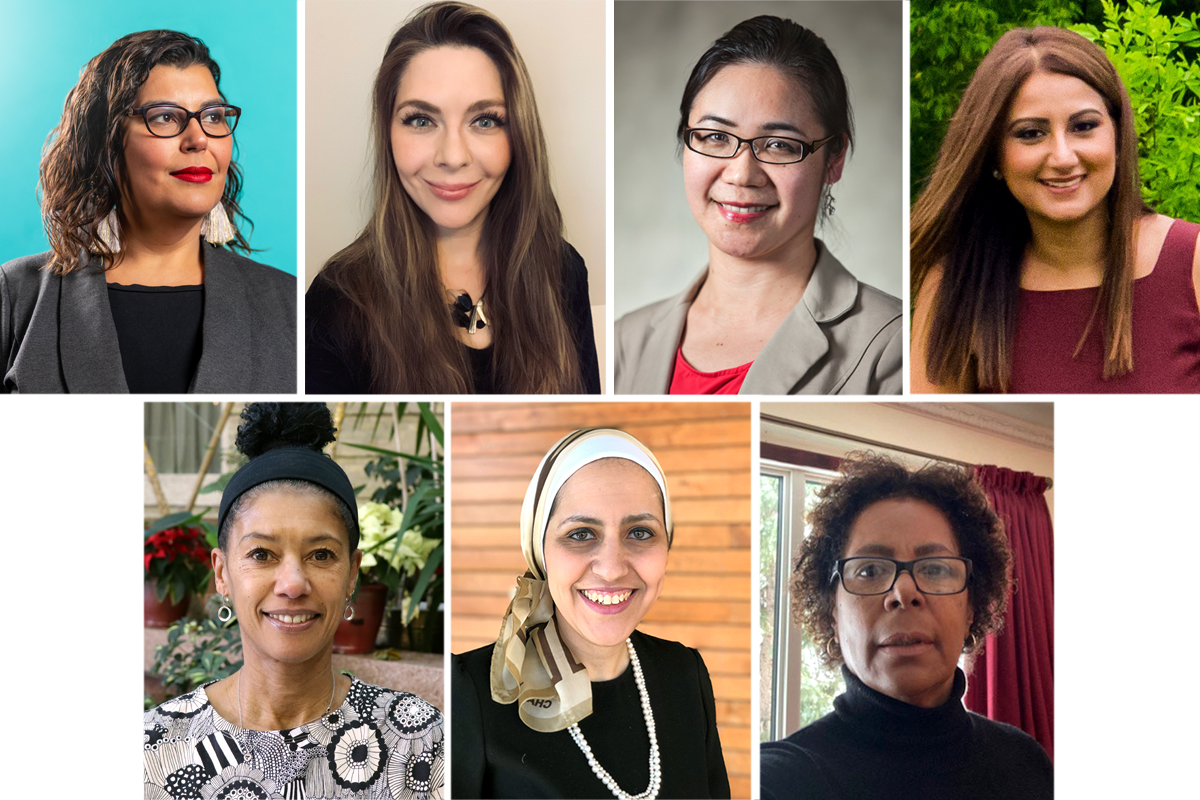
Top row (L to R): Dr. Marcia Anderson, Dr. Vanessa Van Bewer, Dr. Ming-Ka Chan, Raman Dhaliwal. Bottom row (L to R): Dr. Delia Douglas, Dr. Hagar Labouta, Valerie Williams.
‘Breaking the bias’ goes beyond gender: Rady women reflect on International Women’s Day
International Women’s Day, March 8, is an occasion for celebrating the advancements women have made toward gender equality.
Women leaders in the Rady Faculty of Health Sciences say it’s also a day for recognizing the inequities that remain, particularly for BIPOC (Black, Indigenous and other people of colour) women and girls.
Reflecting on the 2022 International Women’s Day theme, #BreakTheBias, Dr. Marcia Anderson, the Cree-Anishinaabe physician who is the Rady Faculty vice-dean of Indigenous health, social justice and anti-racism, notes that it’s been more than 30 years since employment equity initiatives were introduced at Canadian universities.
Yet a 2019 study by Dr. Malinda Smith of the University of Alberta shows that the senior leadership at Canada’s U15 group of research-intensive universities, including UM, is still overwhelmingly white and largely male.
At those 15 institutions, the study found, university presidents were 80 per cent white and 87 per cent male. Provosts and vice-presidents (academic) were 100 per cent white and 67 per cent male. Deans of faculties and schools at the universities were 92 per cent white and 68 per cent male.
“The work that has been done has not adequately removed the barriers to the advancement of Black, Indigenous and other racialized women,” Anderson says. “The theme ‘break the bias’ presents an opportunity to question why advancements have mainly benefited White women, and to refocus on continuing progress for Black, Indigenous and other racialized women.
“Anti-racism is a core foundation of our work at this time. Explicitly identifying the obstacles experienced by Black, Indigenous and other racialized women and intervening in structural ways is how we will work to break the bias.”
We asked other women leaders in the Rady Faculty to reflect on the theme of “break the bias” and how it connects with the Rady Faculty’s commitment to approaching equity, diversity and inclusion (EDI) through an anti-racism and social justice lens. Here’s how they responded:
Dr. Vanessa Van Bewer, assistant professor, College of Nursing:
Bent
The bias is not broken
Maybe slightly bent
Measure not the breaks
But the bias of the bend
Underneath this skirt
Moccasins well bent
But like bias not broken
Warrior sisters hell bent
Dr. Ming-Ka Chan, co-director, Office of Leadership Education, Max Rady College of Medicine:
“Equity means that everyone is provided with what they need to succeed, and everyone has a sense of belonging. Intersectionality is so critical – considering all the axes of power and privilege. I’m motivated by seeing groups and individuals working together to co-create and think about how our spheres of influence overlap and intersect.
“For example, wellness requires being and feeling welcome. That sense of belonging and how we foster that is being explored in the context of oppressed individuals and groups. That is encouraging.”
Raman Dhaliwal, associate vice-president (administration) and executive director, Rady Faculty of Health Sciences:
“Gender equality is an important piece, but there are many other factors that contribute to barriers for women. Breaking the bias in the Rady Faculty of Health Sciences means providing an environment where all individuals feel supported and have equitable opportunities, without being disadvantaged.
“Although I personally have felt supported in my career growth and progression at UM, when I’m participating in leadership discussions, I do notice that sometimes I’m the only person around the table who looks like me or has had a similar path in life. I look forward to being part of further advancing a workplace free of bias, stereotypes and discrimination.”
Dr. Delia Douglas, anti-racism practice lead, Rady Faculty of Health Sciences:
“Our policies, strategies and collective actions for social justice should speak to the complex ways in which gender diversity, race, class, disability and sexuality intersect. It’s imperative that we implement policies and practices that address the integrative nature of women’s lives, namely the different histories and particular vulnerabilities that inform the specific nature of their oppression.
“It’s important to avoid either/or approaches to addressing social justice, so that we don’t reinforce white supremacy while challenging gender inequality.”
Dr. Hagar Labouta, assistant professor, College of Pharmacy:
“We still have a long way to go for an equitable world in which differences are celebrated. We have not done enough to combat forms of discrimination such as Islamophobia, anti-Asian racism and xenophobia. The Rady Faculty has made great strides, but we may further need to create a safe environment for students, staff and faculty to give feedback to our leadership on perceived biases and lived experiences.
“I hope that as a female principal investigator (lead researcher), a hijabi and a visible minority, I send a message that scientists have no stereotype.”
Valerie Williams, director, equity, diversity and inclusion, Rady Faculty of Health Sciences:
“Raising awareness of the negative impacts of bias is important, but we also have to recognize that 60 minutes of implicit bias training will do little to change people’s decision-making. I suggest we focus less on attitudes and more on our policies and systems, as these play a key role in creating the conditions that influence behaviour.
“Let’s create a call-in (as opposed to call-out) culture at Rady and hold one another accountable. If we see someone making a decision based on a bias, let’s speak up and ‘call it in’ with kindness, respect and compassion.”






